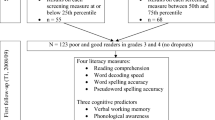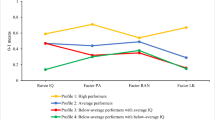Abstract
The purpose of this case series was to explore whether adults who did not have the opportunity to acquire reading skills during childhood are able to do so rapidly if trained with an adequate literacy program. After 14 weeks of training with a new, optimized, literacy course based on cognitive research, six out of eight participants became able to read words they had never encountered, hence demonstrating that they were definitely engaged in decoding processes that allow autonomous reading. Moreover, they showed enhanced phonemic sensitivity and phonological memory. The latter finding implies that functional changes can take place rapidly outside the reading domain even when reading is acquired in adulthood. Thus, there is no major plasticity impediment preventing rapid eradication of illiteracy in adults.




Similar content being viewed by others
Notes
As acknowledged by UNESCO (2016), these data may overestimate actual literacy levels, as they are not based on any test but rather on either self- and third-party declarations or educational attainment proxies.
With this formula, performance at T5 would remain unchanged if a participant succeeded to proceed until module 17, but would be lowered if the participant stopped the test before the end (being thus presented with easier items than one who succeeded in completing the test). The corrected score thus underestimates performance for students who did not reach the end of the test because of time limit. Yet, corrected and uncorrected (calculated on GPCs of modules 3–8) slopes and RGs were strongly correlated, r(6) = .87 and = .89, respectively, both ps < .01, suggesting that our estimation is valid.
We considered this score in correlation computation because the slopes on old and new items were strongly correlated, r(6) = .96.
This analysis took only into account the seven participants who had learned to read to some extent.
References
Abadzi, H. (2003). Adult literacy: A review of implementation experience. Operations Evaluation Department (OED) working paper series. Washington DC: World Bank. Retrieved from http://documents.worldbank.org/curated/en/111821468330039348/Adult-literacy-a-review-of-implementation-experience.
Abadzi, H. (2004). Background paper for the UNESCO education for all global monitoring report 2006. Retrieved from https://uta-ir.tdl.org/uta-ir/handle/10106/24328.
Abadzi, H. (2012). Can adults become fluent readers in newly learned scripts? Education Research International, 2012, 1–8.
Barakat, B. (2016). Improving adult literacy without improving the literacy of adults? A cross-national cohort analysis. World Development, 87, 242–257.
Braga, L. W., Amemiya, E., Tauil, A., Suguieda, D., Lacerda, C., Klein, E., et al. (2017). Tracking adult literacy acquisition with functional MRI: A single-case study. Mind, Brain and Education, 11, 121–132.
Byrne, B., & Fielding-Barnsley, R. (1989). Phonemic awareness and letter knowledge in the child’s acquisitions of the alphabetic principle. Journal of Educational Psychology, 80, 313–321.
Cohen, J. D., MacWhinney, B., Flatt, M., & Provost, J. (1993). PsyScope: A new graphic interactive environment for designing psychology experiments. Behavior Methods, Research, Instruments, and Computers, 25, 257–271.
Crum, R. M., Anthony, J. C., Bassett, S. S., & Folstein, M. F. (1993). Population-based norms for the mini-mental-state-examination by age and educational-level. Journal of the American Medical Association, 269, 2386–2391.
De Grauwe, A., Bitoun, C., Chauvet, A., Gay, D., Hite, S., Suso, E., & Valderrama, A. (2015). The impact of the EFA agenda: Comparing national education plans before and after Dakar. Paper commissioned for the EFA global monitoring report 2015, education for all 2000–2015: Achievements and challenges. Retrieved from http://unesdoc.unesco.org/images/0023/002324/232462e.pdf.
Dehaene, S. (2009). Reading in the brain. New York, NY: Penguin.
Dehaene, S., Cohen, L., Morais, J., & Kolinsky, R. (2015). Illiterate to literate: Behavioural and cerebral changes induced by reading acquisition. Nature Reviews Neuroscience, 16(4), 234–244.
Dehaene, S., Cohen, L., Sigman, M., & Vinckier, F. (2005). The neural code for written words: A proposal. Trends in Cognitive Sciences, 9, 335–341.
Dehaene, S., Pegado, F. Braga, L. W. Ventura, P., Nunes, G., Jobert, A., Dehaene-Lambertz, G., Kolinsky, R., Morais, J., & Cohen, L. (2010). How learning to read changes the cortical networks for vision and language. Science, 330(6009), 1359-1364.
Demoulin, C., & Kolinsky, R. (2016). Does learning to read shape verbal working memory? Psychonomic Bulletin & Review, 23(3), 703-722.
Ehri, L. C., Nunes, S. R., Stahl, S. A., & Willows, D. M. (2001). Systematic phonics instruction helps students learn to read: Evidence from the National Reading Panel’s meta-analysis. Review of Educational Research, 71, 393–447.
Grainger, J., Rey, A., & Dufau, S. (2008). Letter perception: From pixels to pandemonium. Trends in Cognitive Sciences, 12, 381–387.
Guerreiro, M., Silva, A. P., Botelho, M., Leitão, O., Castro-Caldas, A., & Garcia, C. (1994). Adaptação portuguesa da tradução do Mini mental State Examination (MMSE) [Adaptation to the Portuguese population of the translation of the Mini Mental State Examination (MMSE)]. Revista Portuguesa de Neurologia, 1, 9–10.
Jeffreys, H. (1961). Theory of probability (3rd ed.). Oxford: Oxford University Press.
Kolinsky, R. (2015). How learning to read influences language and cognition. In A. Pollatsek & R. Treiman (Eds.), The Oxford Handbook of Reading (pp. 377–393). New York, NY: Oxford University Press.
Kolinsky, R., Carvalho, C., Leite, I., Franco, A., & Morais, J. (in revision). How to teach fully illiterate adults to read. In D. Perin (Ed.), The Wiley Adult Literacy Handbook. Hoboken, NJ: John Wiley & Sons.
Kolinsky, R., Cary, L., & Morais, J. (1987). Awareness of words as phonological entities: The role of literacy. Applied Psycholinguistics, 8(03), 223–232.
Kolinsky, R., Verhaeghe, A., Fernandes, T., Mengarda, E. J. Grimm-Cabral, L., & Morais, J. (2011). Enantiomorphy through the looking-glass: Literacy effects on mirror-image discrimination. Journal of Experimental Psychology: General, 140(2), 210–238.
Lakens, D. (2013). Calculating and reporting effect sizes to facilitate cumulative science: A practical primer for t tests and ANOVAs. Frontiers in Psychology, 4, 863.
Leppänen, U., Aunola, K., Niemi, P., & Nurmi, J.-E. (2008). Letter knowledge predicts grade 4 reading fluency and reading comprehension. Learning and Instruction, 18, 548–564.
Lind, A. (2008). Literacy for all. Making a difference. Paris: UNESCO Publishing.
Longcamp, M., Boucard, C., Gilhodes, J.-C., Anton, J.-L., Roth, M., Nazarian, B., et al. (2008). Learning through hand- or typewriting influences visual recognition of new graphic shapes: Behavioral and functional imaging evidence. Journal of Cognitive Neuroscience, 20, 802–815.
Lorch, R. F., & Myers, J. L. (1990). Regression analyses of repeated measures data in cognitive research. Journal of Experimental Psychology. Learning, Memory, and Cognition, 16, 149–157.
Morais, J., Alegria, J., & Content, A. (1987a). The relationships between segmental analysis and alphabetic literacy: An interactive view. Cahiers de Psychologie Cognitive/ European Bulletin of Cognitive Psychology, 7(5), 415–438.
Morais, J., Alegria, J., & Content, A. (1987b). Segmental awareness: Respectable, useful, and almost always necessary. Cahiers de Psychologie Cognitive/European Bulletin of Cognitive Psychology, 7, 630–556.
Morais, J., Araújo, L., Leite, I., Carvalho, C., Fernandes, S., & Querido, L. (2010). Relatório final, Jan 2008 – Out 2010. Estudo Psicolinguístico. Estabelecimento de Níveis de Referência do Desenvolvimento da Leitura e da Escrita do 1o ao 6o ano de Escolaridade, Plano Nacional de Leitura do Ministério da Educação, Portugal [Final report Jan 2008 - Oct 2010 study Psycholinguistic. Establishment of Reading and writing Development Reference Levels from the first to the 6th year of Education, National Reading Plan of the Ministry of Education, Portugal]. http://www.planonacionaldeleitura.gov.pt/PNLEstudos/uploads/ficheiros/psico_15fev.pdf. Accessed 12 April 2017.
Morais, J., Bertelson, P., Cary, L, & Alegria, J. (1986). Literacy training and speech segmentation. Cognition, 24(1-2), 45–64.
Morais, J., Cary, L., Alegria, J., & Bertelson, P. (1979). Does awareness of speech as a sequence of phones arise spontaneously? Cognition, 7(4), 323-331.
Nation, K., & Hulme, C. (2011). Learning to read changes children’s phonological skills: Evidence from a latent variable longitudinal study of reading and nonword repetition. Developmental Science, 14, 649–659.
Oxenham, J. (2008). Effective literacy programmes: Options for policy makers. Fundamentals of educational planning series (Vol. 91). Paris: UNESCO-IIEP.
Perea, M., Jiménez, M., & Gomez, P. (2015). Do young readers have fast access to abstract lexical representations? Evidence from masked priming. Journal of Experimental Child Psychology, 129, 140–147.
Post, D. (2016). Adult literacy benefits? New opportunities for research into sustainable development. International Review of Education, 62, 751–760.
Robinson, C. (2005). Promoting literacy: What is the record of education for all? International Journal of Educational Development, 25, 436–444.
Rouder, J. N., Speckman, P. L., Sun, D., Morey, R. D., & Iverson, G. (2009). Bayesian t tests for accepting and rejecting the null hypothesis. Psychonomic Bulletin & Review, 16, 225–237.
Royer, J. M., Abadzi, H., & Kinda, J. (2004). The impact of phonological-awareness and rapid-reading training on the reading skills of adolescent and adult neoliterate. International Review of Education, 50, 53–71.
Seymour, P. H. K., Aro, M., & Erskine, J. M. (2003). Foundation literacy acquisition in European orthographies. British Journal of Psychology, 94, 143–174.
Share, D. (1995). Phonological recoding and self-teaching: Sine qua non of reading acquisition. Cognition, 55, 151–218.
Stanovich, K. E., Cunningham, A. E., & Cramer, B. B. (1984). Assessing phonological awareness in kindergarten children: Issues of task comparability. Journal of Experimental Child Psychology, 38, 175–190.
Suggate, S., Schaughency, E., & Reese, E. (2013). Children learning to read later catch up to children reading earlier. Early Childhood Research Quarterly, 28, 33–48.
Thompson, G. B. (2009). The long learning route to abstract letter units. Cognitive Neuropsychology, 26, 50–69.
United Nations. (1961). Resolution 1710 (XVI): United Nations development decade. A programme for international economic cooperation (I). In United Nations General Assembly—16th session. Resolutions adopted on the reports of the Second Committee (pp. 17–18). New York, NY: United Nations.
UNESCO. (1990). World declaration on education for all and framework for action to meet basic learning needs. Paris: UNESCO Publishing.
UNESCO. (2016). Global education monitoring report 2016. Education for people and planet: Creating sustainable futures for all. Paris: UNESCO Publishing.
Waters, G. S., Seidenberg, G. M. S., & Bruck, M. (1984). Children’s and adults’ use of spelling sound information in three reading task. Memory & Cognition, 12, 293–305.
Acknowledgements
Régine Kolinsky is Research Director of the Fonds de la Recherche Scientifique (FRS)–FNRS, Belgium. This work was supported by the FRS-FNRS under grant FRFC 2.4515.12 and by an Interuniversity Attraction Poles (IAP) Grant 7/33, Belspo. We warmly thank the non-governmental community center that lent its facilities for the literacy course and testing, and are very grateful to the participants for agreeing to be enrolled in the course. We also sincerely thank the Editor and the two anonymous Reviewers for their very constructive comments and suggestions, which we believe have led to a significant improvement of the original manuscript.
Author information
Authors and Affiliations
Corresponding author
Appendix
Appendix
See Table 4.
Rights and permissions
About this article
Cite this article
Kolinsky, R., Leite, I., Carvalho, C. et al. Completely illiterate adults can learn to decode in 3 months. Read Writ 31, 649–677 (2018). https://doi.org/10.1007/s11145-017-9804-7
Published:
Issue Date:
DOI: https://doi.org/10.1007/s11145-017-9804-7




